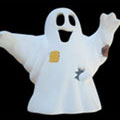Halloween
 Happy Halloween everyone! I know for most,
Happy Halloween everyone! I know for most,me included, this is just a candy holiday, the
more Reece's peanut butter cups and Snickers,
the better! But we all know that the origins of
this holiday had nothing to do with chocolate.
I gleaned some extra info about Halloween
from the American Folklife Center of the
Library of Congress. It began as a Celtic festival held at the end of
summer. Livestock were secured for the winter and crops harvested;
it marked the beginning and ending of an eternal cycle. At the same
time the Celts believed that this was the one time of year that the
dead could mingle with the living; bonfires were lit at these festivals
to honor these dead, and to assist them on their journey to the after-
life. In some cases, animals were also sacrificed, adding yet another
feature to what became known as a pagan holiday, associated with
darkness, death, and dread (and gave rise to our modern day Goths!).
This festival, known as Samhain, eventually began to diminish as
Christianity spread throughout Europe, particularly during the papal
reign of Pope Gregory the First (590 - 604 AD). But rather than destroy
or diminish local customs, Gregory wisely set about to have church
holy days fall on native holy days. Samhain didn't completely disappear
though, as the belief in spirits and the supernatural continued to exist.
It eventually became known as All Hallows Eve (day before the All
Saints celebration), then Hallow Evening, and eventually Hallowe'en.
It came to the U.S. in the mid 1800's, when a large influx of Irish
immigrants came to the U.S. after a devastating potato famine hit
Ireland in the 1840's. Naturally, it took on a whole new meaning in the
new world, to the point where today it is basically fall's version of Mardi
Gras; candy companies make big bucks, as do costume manufacturers
and pumpkin farmers. But corporate America aside, it's fascinating to
learn how an ancient holiday started, what it meant, and how it evolved.
That said - trick or treat...chocolate please!









